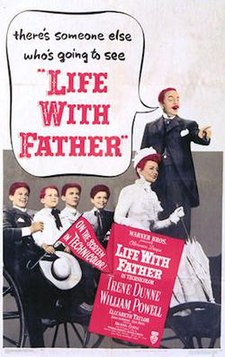Life with Father (film)
| Life with Father | |
|---|---|

Theatrical Film Poster
|
|
| Directed by | Michael Curtiz |
| Produced by | Robert Buckner |
| Screenplay by | Donald Ogden Stewart |
| Based on |
Life with Father 1935 novel by Clarence Day 1939 play by Howard Lindsay Russel Crouse |
| Starring |
William Powell Irene Dunne |
| Music by | Max Steiner |
| Cinematography |
William V. Skall J. Peverell Marley |
| Edited by | George Amy |
| Distributed by | Warner Bros. |
|
Release date
|
|
|
Running time
|
118 min. |
| Country | United States |
| Language | English |
| Budget | $4.7 million |
| Box office | $6.455 million |
Life with Father is a 1947 Technicolor American comedy film. It tells the true story of Clarence Day, a who wants to be master of his house, but finds his wife and his children ignoring him, until they start making demands for him to change his own life. The story draws largely on the insistence by his wife that Clarence be baptized and Clarence's stubborn, sometimes ill-tempered nature. In keeping with the autobiography, all the children in the family (all boys) are redheads. It stars William Powell and Irene Dunne as Clarence and his wife, supported by Elizabeth Taylor as a beautiful teenage girl with whom Clarence's oldest son becomes infatuated, along with Edmund Gwenn, ZaSu Pitts, Jimmy Lydon and Martin Milner. The film and its audio entered the public domain in 1975.
Stockbroker Clarence Day (William Powell), is a benevolent despot of his 1890s New York City household, striving to make it function as efficiently as his Wall Street office but usually failing. His wife Vinnie (Irene Dunne) is the real head of the household. The anecdotal story encompasses such details as Clarence's attempts to find a new maid; a romance between his oldest son Clarence Jr. (Jimmy Lydon) and pretty out-of-towner Mary Skinner (Elizabeth Taylor); a plan by Clarence Jr. and his younger brother John (Martin Milner) to make easy money selling patent medicines; Clarence's general contempt for the era's political corruption and the trappings of organized religion; and Vinnie's push to get him baptized so he can enter the kingdom of God.
Due to the Motion Picture Production Code standards of the day, the play's last line (in response to a policeman asking Mr. Day where he is going), "I'm going to be baptized, dammit!" had to be rewritten for the film.
...
Wikipedia
